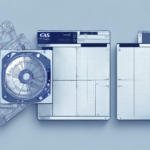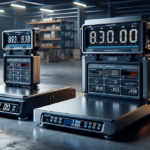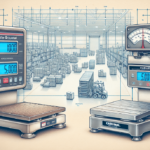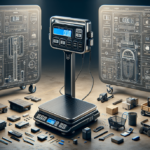Salter Brecknell PS1000 vs CAS RW-L Series: An In-Depth Comparison
Choosing the right scale for commercial or personal use can be challenging. Two prominent brands in the market are Salter Brecknell and CAS, offering their respective models PS1000 and RW-L Series. This comprehensive analysis compares these two models to help you make an informed decision based on the latest industry standards and user requirements.
Introduction to the Salter Brecknell PS1000 and CAS RW-L Series
The Salter Brecknell PS1000 is a heavy-duty platform scale designed primarily for commercial use. It features a robust steel construction capable of weighing up to 1,000 lbs with a resolution of 0.5 lbs. In contrast, the CAS RW-L Series is built for more demanding environments, offering a substantial capacity of 5,000 lbs with a resolution of 1 lb.
Both scales are equipped with large, easy-to-read displays that show weight measurements in either pounds or kilograms. Additionally, the Salter Brecknell PS1000 includes a built-in rechargeable battery, making it ideal for areas without reliable power sources. The CAS RW-L Series offers a detachable display that can be mounted on a wall or placed on a desk for convenient viewing. Both models are known for their reliability and accuracy, making them excellent choices for businesses requiring precise weight measurements.
Specifications and Features
Salter Brecknell PS1000
- Display: Bright LED display, readable in various lighting conditions.
- Power: Built-in rechargeable battery for portable use.
- Platform Size: 22" x 18", designed for durability in commercial settings.
- Weighing Units: Supports lb, kg, g, and oz.
- Capacity: Up to 1,000 pounds with a precision of 0.2% of the applied load.
- Connectivity: Built-in RS-232 interface for communication with computers or printers.
The PS1000's sturdy construction and high weight capacity make it suitable for a wide range of applications, from retail environments to industrial settings. Its precision ensures accurate measurements, which are critical for businesses that rely on exact weight data.
CAS RW-L Series
- Display: Large, bright LED display available in lb and kg units.
- Platform Size: 48" x 48", suitable for larger items.
- Weighing Units: Primarily lb and kg.
- Capacity: Up to 10,000 pounds with a resolution of 1 lb.
- Storage: Can store and recall up to 100 items, ideal for repetitive weighing tasks.
- Connectivity: RS-232C serial port, with additional options for Ethernet and USB connectivity.
- Power: Built-in rechargeable battery lasting up to 100 hours on a single charge.
The CAS RW-L Series is engineered for high-capacity and heavy-duty applications, making it ideal for warehouses, manufacturing plants, and other industrial environments. Its advanced features, such as data storage and multiple connectivity options, enhance its functionality for business operations.
Pricing Comparison
The Salter Brecknell PS1000 is generally more affordable, with prices starting around $500. This makes it a cost-effective option for businesses with budget constraints or those requiring scales for lighter loads.
In contrast, the CAS RW-L Series is priced higher, ranging from $1,000 to $5,000, depending on the model and features selected. While the initial investment is greater, the CAS RW-L Series offers higher capacity and more advanced features, which can be advantageous for businesses with larger operational needs.
When considering budget versus capacity and features, it's essential to evaluate your specific requirements to determine which scale offers the best value for your situation.
Performance Comparison
Both scales provide accurate and reliable readings, but they cater to different needs.
- Capacity: The PS1000 handles up to 1,000 lbs, suitable for smaller loads, whereas the RW-L Series manages up to 10,000 lbs, ideal for heavy-duty applications.
- Durability: The CAS RW-L Series features a heavy-duty stainless steel platform, offering greater resistance to wear and tear compared to the plastic platform of the PS1000.
- Advanced Features: The RW-L Series includes a built-in printer and computer connectivity for data analysis, enhancing its utility in data-driven environments.
Choosing between these scales depends on your performance needs. For heavier loads and more intensive use, the CAS RW-L Series is superior. For lighter tasks requiring precision, the Salter Brecknell PS1000 is more appropriate.
Ease of Use
The Salter Brecknell PS1000 is praised for its user-friendly interface, featuring an easy-to-read display and a simple operational design. Its lightweight and portable nature make it convenient for use in various locations.
On the other hand, the CAS RW-L Series offers more advanced functionalities, which may require a learning curve for some users. However, features like unit switching and display hold can enhance the efficiency and precision of weighing tasks.
- PS1000: Easy to operate, portable, and durable for industrial use.
- RW-L Series: Advanced features with a steeper learning curve, suitable for users needing sophisticated functionalities.
Ultimately, the ease of use will depend on the user's familiarity with scale features and the specific requirements of their tasks.
Durability and Build Quality
Both the PS1000 and RW-L Series are built with sturdy materials, but they are designed for different environments.
- PS1000: Features a durable steel construction suitable for regular commercial use. However, it may not withstand extremely harsh conditions.
- RW-L Series: Engineered with a heavy-duty stainless steel frame and a non-slip platform, making it ideal for rugged industrial environments.
Additionally, the PS1000's simpler design may result in lower maintenance and repair costs compared to the more complex RW-L Series.
Customer Reviews
Customers have generally provided positive feedback for both scales, highlighting their accuracy, reliability, and ease of use.
- PS1000: Users appreciate its affordability, portability, and user-friendly interface. Some have noted occasional issues during heavy use.
- RW-L Series: Lauded for its durability and long-lasting performance, though some customers consider its higher price point a drawback.
Overall, the Salter Brecknell PS1000 is favored for budget-conscious users needing reliable performance for lighter loads, while the CAS RW-L Series is preferred by businesses requiring high-capacity scales with advanced features.
Which Scale is Better for Commercial Use?
The decision hinges on your specific commercial needs. If your operations involve lighter loads and you are budget-conscious, the Salter Brecknell PS1000 is a suitable choice. Conversely, for businesses dealing with heavier loads and requiring advanced features, the CAS RW-L Series is more appropriate.
Which Scale is Better for Personal Use?
For personal or occasional use, the Salter Brecknell PS1000 is more affordable and practical. Its portability and ease of storage make it ideal for home use, workshops, or small businesses. The heavier and bulkier CAS RW-L Series is typically unnecessary for personal applications.
Conclusion: Choosing Between Salter Brecknell PS1000 and CAS RW-L Series
Your choice between the Salter Brecknell PS1000 and the CAS RW-L Series should be based on your specific requirements. The PS1000 is excellent for those needing a reliable, cost-effective scale for lighter loads, while the RW-L Series is designed for heavy-duty use in demanding environments.
Final Thoughts on Selecting the Right Scale for Your Needs
When selecting a scale, consider factors such as capacity, accuracy, ease of use, durability, and budget. Assess the specific applications you intend to use the scale for and choose a model that aligns with your operational needs. By evaluating these aspects, you can ensure that you select the most suitable scale for your requirements.






















